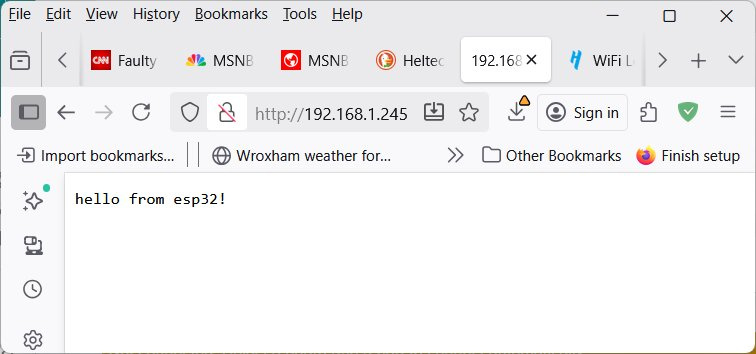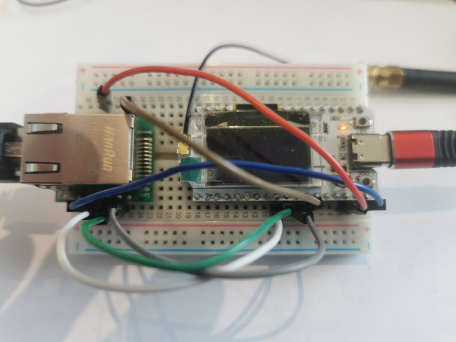try the following which uses the RadioLib Library
I try to keep code for different modules in separate files in the same directory
LoRa P2P transmit file Heltec_V3_SX126x_LoRa_Transmit_W550_HSPI.ino
// Heltec LoRa SX1262 transmit test
// File>Examples>RadioLib>SX126x>SX126x_Transmit_Interrupt
// EDITs:
// radio.begin frequency set to 868.0
// transmitting byte array and printing it
/*
RadioLib SX126x Transmit with Interrupts Example
This example transmits LoRa packets with one second delays
between them. Each packet contains up to 256 bytes
of data, in the form of:
- Arduino String
- null-terminated char array (C-string)
- arbitrary binary data (byte array)
Other modules from SX126x family can also be used.
For default module settings, see the wiki page
https://github.com/jgromes/RadioLib/wiki/Default-configuration#sx126x---lora-modem
For full API reference, see the GitHub Pages
https://jgromes.github.io/RadioLib/
*/
// include the library
#include <RadioLib.h>
// Heltec LoRa V3 SX1262 has the following connections:
// NSS pin: 8
// DIO1 pin: 14
// NRST pin: 12
// BUSY pin: 13
SX1262 radio = new Module(8, 14, 12, 13);
// or detect the pinout automatically using RadioBoards
// https://github.com/radiolib-org/RadioBoards
/*
#define RADIO_BOARD_AUTO
#include <RadioBoards.h>
Radio radio = new RadioModule();
*/
// save transmission state between loops
int transmissionState = RADIOLIB_ERR_NONE;
// flag to indicate that a packet was sent
volatile bool transmittedFlag = false;
// this function is called when a complete packet
// is transmitted by the module
// IMPORTANT: this function MUST be 'void' type
// and MUST NOT have any arguments!
#if defined(ESP8266) || defined(ESP32)
ICACHE_RAM_ATTR
#endif
void setFlag(void) {
// we sent a packet, set the flag
transmittedFlag = true;
}
// W5500 Ethernet prototypes
void W5500setup(void);
void W5500loop(void);
void setup() {
Serial.begin(115200);
delay(2000);
W5500setup(); // setup W5500 Erthernet
// initialize SX1262 with default settings
Serial.print(F("\n\nHeltec LoRa V3 [SX1262] Initializing ... "));
int state = radio.begin(868.0);
if (state == RADIOLIB_ERR_NONE) {
Serial.println(F("success!"));
} else {
Serial.print(F("failed, code "));
Serial.println(state);
while (true) { delay(10); }
}
// set the function that will be called
// when packet transmission is finished
radio.setPacketSentAction(setFlag);
// start transmitting the first packet
Serial.print(F("[SX1262] Sending first packet ... "));
// you can transmit C-string or Arduino string up to
// 256 characters long
transmissionState = radio.startTransmit("Hello World!");
// you can also transmit byte array up to 256 bytes long
/*
byte byteArr[] = {0x01, 0x23, 0x45, 0x67,
0x89, 0xAB, 0xCD, 0xEF};
state = radio.startTransmit(byteArr, 8);
*/
}
// counter to keep track of transmitted packets
int count = 0;
void loop() {
// check W5500 Ethernet
W5500loop();
// check if the previous LoRa transmission finished
if (transmittedFlag) {
// reset flag
transmittedFlag = false;
if (transmissionState == RADIOLIB_ERR_NONE) {
// packet was successfully sent
Serial.println(F("transmission finished!"));
// NOTE: when using interrupt-driven transmit method,
// it is not possible to automatically measure
// transmission data rate using getDataRate()
} else {
Serial.print(F("failed, code "));
Serial.println(transmissionState);
}
// clean up after transmission is finished
// this will ensure transmitter is disabled,
// RF switch is powered down etc.
radio.finishTransmit();
// wait a second before transmitting again
delay(1000);
// send another one
Serial.print(F("[SX1262] Sending another packet ... "));
// you can transmit C-string or Arduino string up to
// 256 characters long
//String str = "Hello World! #" + String(count++);
//transmissionState = radio.startTransmit(str);
// you can also transmit byte array up to 256 bytes long
static byte byteArr[] = { 0x01, 0x23, 0x45, 0x67,
0x89, 0xAB, 0xCD, 0xEF };
for (int i = 0; i < sizeof(byteArr); i++)
Serial.printf("%d ", byteArr[i]);
transmissionState = radio.startTransmit(byteArr, 8);
byteArr[0]++;
}
}
W5500 Ethernet file HelloServer_HSPI.ino (in same directory as above .ino file)
// Heltec LoRa V3 W5500 Ethernet test
/*
* HelloServer example from the ESP32 WebServer library modified for Ethernet.
*/
#include <EthernetESP32.h>
#include <WebServer.h>
#include <ESPmDNS.h>
// define Heltec LoRa V3 W5500 SPI pins
#define W5500_SCK 40
#define W5500_MISO 42
#define W5500_MOSI 39
#define W5500_CS 41
W5500Driver driver(W5500_CS); // SPI SS is GPIO34
//ENC28J60Driver driver;
//EMACDriver driver(ETH_PHY_LAN8720);
SPIClass hspi(HSPI); // HSPI object used by W5500
WebServer server(80);
const int led = 13;
void handleRoot() {
digitalWrite(led, 1);
server.send(200, "text/plain", "hello from esp32!");
digitalWrite(led, 0);
}
void handleNotFound() {
digitalWrite(led, 1);
String message = "File Not Found\n\n";
message += "URI: ";
message += server.uri();
message += "\nMethod: ";
message += (server.method() == HTTP_GET) ? "GET" : "POST";
message += "\nArguments: ";
message += server.args();
message += "\n";
for (uint8_t i = 0; i < server.args(); i++) {
message += " " + server.argName(i) + ": " + server.arg(i) + "\n";
}
server.send(404, "text/plain", message);
digitalWrite(led, 0);
}
void W5500setup(void) {
pinMode(led, OUTPUT);
digitalWrite(led, 0);
Serial.begin(115200);
delay(2000);
// setup SPI pins
hspi.begin(W5500_SCK, W5500_MISO, W5500_MOSI, W5500_CS);
driver.setSPI(hspi); // specify driver SPI interface
Ethernet.init(driver); // initialise driver
Serial.println("Initialize Ethernet with DHCP:");
if (Ethernet.begin()) {
Serial.print(" DHCP assigned IP ");
Serial.println(Ethernet.localIP());
} else {
Serial.println("Failed to configure Ethernet using DHCP");
while (true) {
delay(1);
}
}
if (MDNS.begin("esp32")) {
Serial.println("MDNS responder started");
}
server.on("/", handleRoot);
server.on("/inline", []() {
server.send(200, "text/plain", "this works as well");
});
server.onNotFound(handleNotFound);
server.begin();
Serial.println("HTTP server started");
}
void W5500loop(void) {
server.handleClient();
delay(2); //allow the cpu to switch to other tasks
}
Heltec LoRa V3 serial monitor output
Initialize Ethernet with DHCP:
DHCP assigned IP 192.168.1.245
MDNS responder started
HTTP server started
Heltec LoRa V3 [SX1262] Initializing ... success!
[SX1262] Sending first packet ... transmission finished!
[SX1262] Sending another packet ... 1 35 69 103 137 171 205 239 transmission finished!
[SX1262] Sending another packet ... 2 35 69 103 137 171 205 239 transmission finished!
[SX1262] Sending another packet ... 3 35 69 103 137 171 205 239 transmission finished!
[SX1262] Sending another packet ... 4 35 69 103 137 171 205 239 transmission finished!
[SX1262] Sending another packet ... 5 35 69 103 137 171 205 239 transmission finished!
[SX1262] Sending another packet ... 6 35 69 103 137 171 205 239 transmission finished!
the Helloserver output appears on 192.168.1.245 OK
the data transmitted by the Heltec LoRa V3 ir received by a Heltec LoRa V2
Heltec LoRa V2 SX1276 [SX1276] Initializing ... success!
[SX1276] Starting to listen ... success!
[SX1276] Received packet!
[SX1276] Data: 3 35 69 103 137 171 205 239
[SX1276] RSSI: -52.00 dBm
[SX1276] SNR: 12.75 dB
[SX1276] Frequency error: -1696.60 Hz
[SX1276] Received packet!
[SX1276] Data: 4 35 69 103 137 171 205 239
[SX1276] RSSI: -51.00 dBm
[SX1276] SNR: 12.50 dB
[SX1276] Frequency error: -1692.40 Hz
[SX1276] Received packet!
[SX1276] Data: 5 35 69 103 137 171 205 239
[SX1276] RSSI: -52.00 dBm
[SX1276] SNR: 12.75 dB
[SX1276] Frequency error: -1692.40 Hz
[SX1276] Received packet!
[SX1276] Data: 6 35 69 103 137 171 205 239
[SX1276] RSSI: -52.00 dBm
[SX1276] SNR: 12.50 dB
[SX1276] Frequency error: -1688.21 Hz
[SX1276] Received packet!
[SX1276] Data: 7 35 69 103 137 171 205 239
[SX1276] RSSI: -52.00 dBm
what Ethernet functionality are you looking at using?





